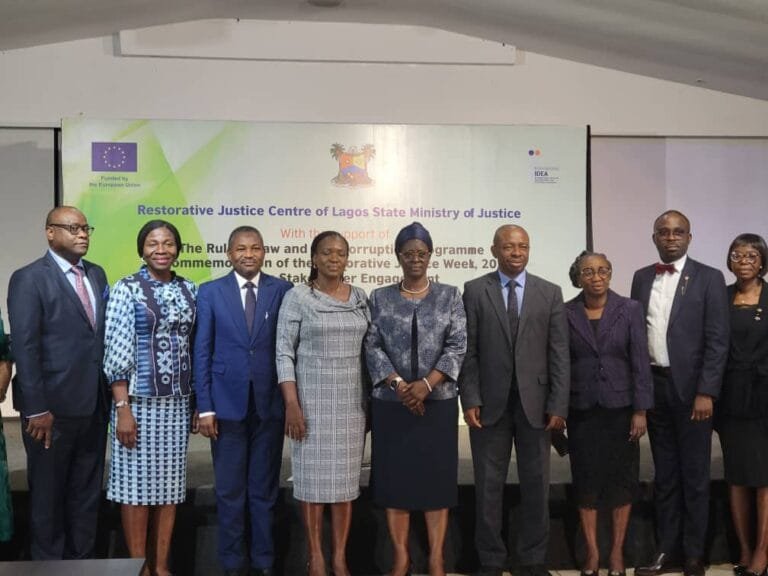The Lagos State Chief Judge, Justice Kazeem Alogba and the Attorney General and Commissioner for Justice, Lawal Pedro (SAN), have identified a collaborative effort of government agencies, the judiciary, civil societies and community leaders as the pathway to scale up the impact of restorative justice in Nigeria.
The duo pointed out that the concept of restorative justice is deeply rooted in healing and reconciliation, noting that the initiative was already being embraced by countries around the world.
They spoke at a stakeholders’ engagement in commemoration of Restorative Justice Week, 2024, organised by Restorative Justice Centre of Lagos State Ministry of Justice with support of the Rule of Law and Anti-Corruption (RoLAC) programme.
The programme, funded by the European Union and implemented by the International Institute for Democracy and Electoral Assistance (International IDEA), underscores the essence of collaboration aimed to bring together government agencies, the judiciary, civil society, and community leaders.
Speaking, Alogba who was represented at the event by Justice Adeyinka Adeyemi described the conversation on restorative justice as very apt, saying it came at a time when decongestion of the court is in the front burner of the criminal justice system.
He noted: “We know that in applying restorative justice, few children in conflict with the law have potential of reducing recidivism, promoting integration and rehabilitation of these children who are in conflict with the law.
“Most importantly, it will invariably decongest the court, particularly the magistrate court. This is a welcome development because it will reduce the docket of the court,” Alogba stated.
On his part, Pedro said restorative justice’s approach aligns with the government’s commitment to fostering a fair, inclusive and people centred justice system.
Pedro, who was represented by a Director and Senior Special Assistant (SSA), Adebayo Haroun, hinted that over the years, Lagos State has been a trailblazer in promoting innovative justice reforms and restorative justice which stands as a cornerstone of these efforts.
He said: “Your role as stakeholders is critical in bridging gaps, creating awareness, and ensuring that every citizen has access to justice that is not only swift but also transformative.”
Also, Mrs. Adeyinka Aroyewun, said the establishment of the Restorative Justice Centre in 2022 marked the beginning of a new chapter in the criminal justice sector.
Aroyewun noted that since the establishment of the RJ Centre, 177 cases have been referred, with 83 cases resolved amicably.
Each resolved case, she noted, represented not just numbers but real lives impacted positively, “it translates into 83 fewer court cases and a reduction in correctional facility congestion.”
Going forward, she recommended institutionalised funding, strengthened collaboration, expanded training and capacity building, promotion of a culture of dialogue and peace.
The State Coordinator of RoLAC, Mrs. Ajibola Ijimakinwa, said the RoLAC programme was committed to consolidating the law and strengthening anti-corruption efforts in Nigeria.
“RoLAC strives to ensure that justice service delivery is robust, transparent, and responsive to the needs of all Nigerians.
“Over the past year, RoLAC and its partners, including the Lagos State Restorative Justice Centre, have worked diligently to promote restorative justice practices.”

